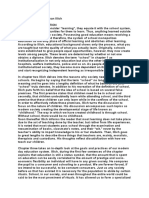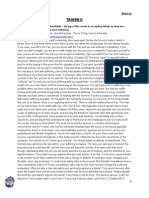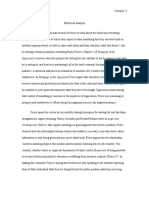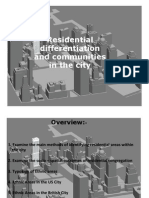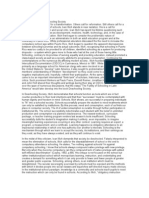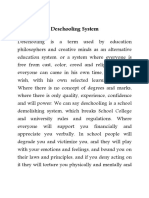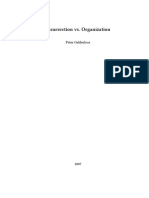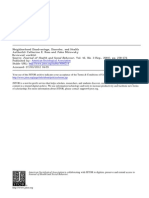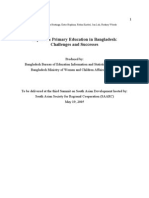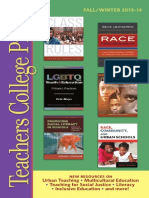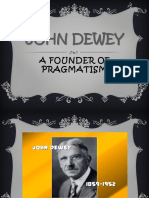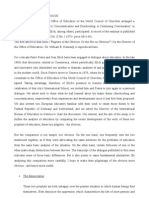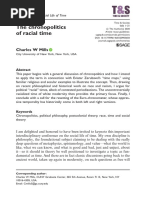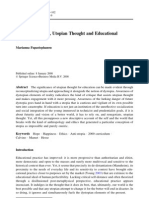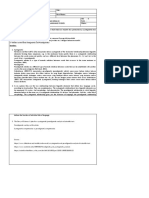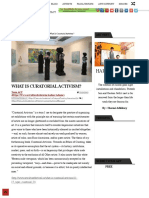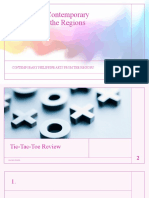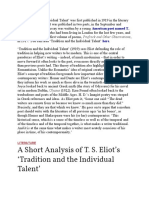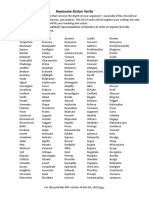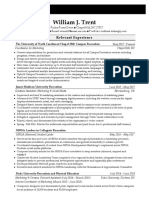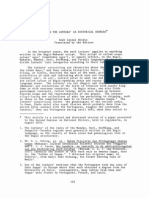Deschooling Virtuality
Deschooling Virtuality
Uploaded by
3WayOutCopyright:
Available Formats
Deschooling Virtuality
Deschooling Virtuality
Uploaded by
3WayOutOriginal Title
Copyright
Available Formats
Share this document
Did you find this document useful?
Is this content inappropriate?
Copyright:
Available Formats
Deschooling Virtuality
Deschooling Virtuality
Uploaded by
3WayOutCopyright:
Available Formats
Open Review of Educational Research
ISSN: (Print) 2326-5507 (Online) Journal homepage: http://www.tandfonline.com/loi/rrer20
Deschooling Virtuality
Petar Jandri
To cite this article: Petar Jandri (2014) Deschooling Virtuality, Open Review of Educational
Research, 1:1, 84-98, DOI: 10.1080/23265507.2014.965193
To link to this article: http://dx.doi.org/10.1080/23265507.2014.965193
2014 The Author(s). Published by
Routledge.
Published online: 02 Dec 2014.
Submit your article to this journal
Article views: 816
View related articles
View Crossmark data
Full Terms & Conditions of access and use can be found at
http://www.tandfonline.com/action/journalInformation?journalCode=rrer20
Download by: [201.214.17.127]
Date: 17 October 2015, At: 08:52
Open Review of Educational Research, 2014
Vol. 1, No. 1, 8498, http://dx.doi.org/10.1080/23265507.2014.965193
Deschooling Virtuality
PETAR JANDRIC
Polytechnic of Zagreb, Croatia
Downloaded by [201.214.17.127] at 08:52 17 October 2015
Abstract
This article explores contemporary potentials for Illichs 1971 proposal to replace institutional
schooling with non-institutional large-scale educational infrastructure, and shows that his
visions of deschooling through technology could be embodied on the internet in the form of
deschooling virtuality. This conclusion is methodologically restricted in three ways. First, the
concept of deschooling heavily depends on ones views to human nature. Second, deschooling
society is dialectically intertwined with the concept of conviviality, while deschooling virtuality is
based on non-convivial technologies which lead directly to radical monopoly. Third, even the
most developed deschooling virtuality might never transform into deschooling society. Despite
those restrictions, the article concludes that Illichs deschooling has graduated from mere vision
to the real opportunity. Realization of this opportunity will depend on future scientific and
social developments and, ultimately, on collective human decision.
Keywords: Ivan Illich, deschooling, conviviality, virtuality, anarchism, hacker ethic
Introduction
Radical thinkers have always heavily despised schools. Schools have been accusedand
completely rightfullyfor many evils such as social reproduction, indoctrination, failing
to respect individual needs of their patrons, stupefying In order to fight against those
evils, radical educators have developed an impressive body of alternatives ranging from historical non-institutionalized educational practices such as Tolstoys Yasnaya Polyana
(Tolstoy, 1904) to contemporary examples such as Anarchist Free Skool (Shantz,
2012). However, while most historic alternatives have replaced institutionalized schools
by less formal approaches, only the rare have dared to challenge the very essence of the
concept of schooling.
Far on the fringes of educational praxis, much further than regular radicals who oppose
traditional schools because they inculcate wrong ideas or fail to respect pupils personality,
An early draft of this article has been presented at the conference Medicine, Society and Human Beings: Ivan
Illichs (19262002) critique ten years after his death at the University of Rijeka, Croatia.
2014 The Author(s). Published by Routledge.
This is an Open Access article distributed under the terms of the Creative Commons Attribution License (http://
creativecommons.org/licenses/by/3.0/), which permits unrestricted use, distribution, and reproduction in any medium, provided
the original work is properly cited. The moral rights of the named author(s) have been asserted.
Downloaded by [201.214.17.127] at 08:52 17 October 2015
Deschooling Virtuality
85
there is a small stream of educators who advocate complete abandonment of the concept of
schooling. Those people agree that education is an intrinsic part of human nature: we all
learn and unlearn from cradle to grave. However, they point out that schooling is an institutionalized process of meeting certain educational outcomes. They are not against education: they merely claim that the process of education is completely detached from the
process of schooling, and that schools should be replaced in favour of more efficient educational processes. In the recent study, Joseph Todd describes the project of deschooling
as follows: Anarchists and deschoolers, as well as educational theorists, argue for the creation of networks, as opposed to institutions, that are temporary, autonomous, and nonhierarchical, and facilitate a variety of diverse models of learning and community interaction (Todd, 2012, p. 78).
Genesis of argument against schooling can be traced in several major works such as
Everett Reimers School is Dead (1971), Paul Goodmans Compulsory Miseducation
(1973) and Matt Herns Deschooling our Lives (1998). Back in 1971, however, the small
book called Deschooling Society provoked worldwide debates about the future of schooling
and has placed Ivan Illich on the unofficial throne of the project of deschooling. Such positioning of Illichs work has not arrived from thin air. According to Atasay, what distinguishes Illichs work from other critiques of industrial everyday life ( ) is that Illich
offers us alternatives, tools that can influence power and offer individuals and communal
settings the potential for alternative vernacular practices to emerge in culture (2013,
p. 58). In order to replace traditional schools, Illich proposes creating large scale non-institutional educational infrastructure which consists of a set of four interlocking educational
networks: reference services to educational objects, skill exchanges, peer-matching and
reference services to educators-at-large (Illich, 1971).
Based on this proposition, Hart concludes that it is not too far-fetched to assert that
Illich predicted the World Wide Web (2001, p. 72). A decade later, Jandric asserts
that his proposal of learning webs is strikingly similar to the basic principles of Wikipedia
(2010, p. 54). Inspired by those similarities, Jandric and Boras (2012, pp. 7274) have
inquired deeper into contemporary information and communication technologies and
shown that they provide adequate technical infrastructure for Illichs educational networks. Joseph Todd (2012) explores Illichs ideas in the context of contemporary anarchopedagogy and develops deschooling into unschooling. Shane J. Ralston analyses
pre-publication networks: websites specifically designed for informal online dissemination
of scholarly work (ideas, research proposals, abstracts and even full papers) prior to publishing with mainstream academic journals. Based on Illichs concept of conviviality, he
asserts that they might be the perfect partners in a grassroots movement to deinstitutionalize e-learning, and suggests that it might be useful to spread the gospel of online
pre-publication with the expectation of gradually overcoming top-down e-learning on
the business model (Ralston, in press). Lydia Rose asserts that Illichs conclusion that
the right to learn is curtailed by the obligation to attend school is confounded with
the means in which attending school has changed technologically with the advent of the
internet and subversive epistemologies regarding time and space in learning environments (Rose, in press). Based on growing interest in the relationships between Illichs
ideas and contemporary information and communication technologies, it seems that
the time for serious revisiting of his argument against schooling has finally arrived.
86
Petar Jandric
Downloaded by [201.214.17.127] at 08:52 17 October 2015
Why Deschooling?
Implicitly or explicitly, educators have always recognized their position in and against
dominant social forces commonly described as Gramscis (1992) superstructures: political
power relationships, institutions, culture and the state. At the one hand, education is supposed to liberate people from ignorance and poverty; at the other hand, educational liberation is brought by middle-class teachers who, often unwillingly and/or unconsciously,
inculcate dominant value systems and reproduce traditional social inequalities. This power
dynamic creates a vicious circle on all levels of educational praxis, including but not
limited to the nature of teacher employment. Working within the current educational
systems, educators are intrinsic parts of educational Ideological State Apparatuses
(Althusser, 2008) which contribute to increasing social inequality. (To make things
worse, they are also blamed more than ever for any perceived shortcomings in the
system.) Those who resign might feel better with themselves, but the next person in
line will step into their places and perpetuate the system. Adapted from collective work
of the small group of British scholars called London Edinburgh Weekend Return Group
(Mitchell et al., 1979), the concept in and against superstructures succinctly summarizes
Illichs argument against schooling. However, while the majority of radical educators
seek solution in opposition from this unfavourable position (Mitchell et al., 1979), Illich
asserts that all such attempts are deemed a failure and looks for radically different
approaches.
Illichs argument departs from his wide critique of institutionalization of the contemporary society. Medical treatment is mistaken for health care, social work for the improvement of community life, police protection for safety, military poise for national security,
the rat race for productive work (Illich, 1971, p. 3). Institutionalized society is dialectically
intertwined with institutionalized education. The pupil is thereby schooled to confuse
teaching with learning, grade advancement with education, a diploma with competence,
and fluency with the ability to say something new (Illich, 1971, p. 3). Institutionalized
educational systems are necessarily dehumanized. Hence, institutionalized society
reduces people to producers and consumers. In the context of learning it could be
argued that this is not always bad, as a form of the relationship between producers and consumers naturally underpins learning (beyond schooling). What makes institutionalized
educational systems dehumanized, however, are the static models of delivering education
and often perverse ways they feed into capital. Following the line of argument very similar
to Frankfurt School critiques of technologies exposed in Herbert Marcuses One-dimensional man (1964) and Martin Heideggers Only a God can save us interview (1981),
Illich shows that stability of institutionalized society is based on constant economic
growth. Deeply rooted in the spirit of 1960s and 1970s, he finally concludes that such a
model inevitably leads towards ecological destruction of our planet.
Width and depth of Illichs argument represent one of his biggest contributions to
science and one of the biggest challenges for those who would like to understand his
work. According to Kahn and Kellner,
One need not commit to Illichs indictment of education, however, to realize
that one of his enduring contributions is the manner in which he perceived
the deep ideological relationships between modern institutions like schooling,
Deschooling Virtuality
87
Downloaded by [201.214.17.127] at 08:52 17 October 2015
the church, factory production, medicine, the media and transportation systems
as aspects of unchecked industrial society. (Kahn & Kellner, 2007, p. 438)
In the last chapter of Deschooling Society, former Jesuit Illich develops his ecological argument using the ancient myth of Prometheus and Epimetheus. Prometheus is usually
thought to mean foresight ( ) He tricked the gods out of their monopoly of fire,
taught men to use it in the forging of iron, became the god of technologists, and wound
up in iron chains (Illich, 1971, pp. 4849). Epimetheus is his exact opposite. He values
hope above expectations, loves people more than products, and loves the earth on
which each can meet the other (Illich, 1971, p. 49). Promethean man is all around us:
in industry, commerce, education. Even most humanistic radical educational politics,
such as Freires, often reflect Promethean sentiment (Kahn & Kellner, 2007, pp. 437
438). Illichs Epimethean politics, however, seeks exactly the opposite in those who collaborate with their Promethean brother in the lighting of the fire and the shaping of
iron, but who do so to enhance their ability to tend and care and wait upon the other
(Illich, 1971, p. 49). Based on dichotomy between Promethean and Epimethean
approaches, Illich develops profound critique of our technological society in his next
book Tools for Conviviality (1973). Certainly, the two critiques are dialectically connected:
non-institutional large-scale educational infrastructure to replace institutional schooling
must necessarily be convivial.
Deschooling in the Network Society
In the recent book Critical e-learning: Struggle for Power and Meaning in the Network Society
(2012), Jandric and Boras have explored potentials of various communication technologies for Illichs deschooling. Anchored deeply within their social habitus (Bourdieu,
2007), communication technologies have been classified along the lines of two distinct
sociological concepts. Pre-digital technologies belong to what Jan van Dijk (1999) and
Manuell Castells (2001) call the mass society, while digital technologies are linked to
the so-called network society. To an extent, this distinction is not very precise: for instance,
it implies that digital radio receiver still belongs to the mass society despite its microchipbased nature. However, it clearly reflects the conceptual framework of critical theory which
sees technologies as inseparable from the spirit of the times (Feenberg, 2002).
According to van Dijk, mass society is a term used for the type of society that developed
during the industrial revolution when large concentrations of people came together in
industrial towns and trading centres (1999, p. 23). Pre-digital media of the mass
society, such as radio and television, consist of one-way communication between
centres of power and peripheries: the chosen few perform and talk, while the rest of the
population watches and listens. Therefore, technologies of the mass society do not
provide adequate infrastructures for Illichs webs. In contrast, the network society is
associated with social and media networks, and individuals, households, groups and
organizations linked by these networks (van Dijk, 1999, p. 24). The internet provides
all users with equal opportunities to read and write, listen and talk. In the first page of
The Internet Galaxy: Reflections on the Internet, Business, and Society, Castells wrote one of
the best descriptions of its ubiquitous nature:
88
Petar Jandric
Downloaded by [201.214.17.127] at 08:52 17 October 2015
The Internet is the fabric of our lives. If information technology is the presentday equivalent of electricity in the industrial era, in our age the Internet could
both be linked to the electrical grid and the electric engine because of its
ability to distribute the power of information throughout the entire realm of
human activity. (2001, p. 1)
Obviously, technical structure of the internet well corresponds to Illichs learning webs.
However, virtual worlds created by the internet still reflect power relationships, values
and organization of the mass society (Jandric & Boras, 2012, pp. 7274). Probably the
most famous example of tensions between traditions of the mass society and technical
opportunities offered by the internet is the case of intellectual rights. Everyone knows
that the traditional concept of copyright simply cannot be sustained on the internet
nevertheless, governments and corporations still predominantly hold to traditional
values and business models (van Dijk, 1999; Castells, 2001).
Such tensions are inherent to the wide, descriptive nature of the classification of our
present and past realities to two distinct categories. In some aspects, the mass society
and the network society are fundamentally similar; in others, they are just as fundamentally
different. According to van Dijk,
a final qualification to add is that the information and network society concepts
indicate long-term evolutionary processes of human society. They are not concrete societal forms with precise historical beginnings and ends. To clarify this
one might say that the information society did not start in 1751 with the appearance of the first part of the Encyclopdie of Diderot and dAlembert and the
network society did not appear with the installation of the first telegraph line
by Samuel Morse in 1844. (van Dijk, 1999, p. 21)
Despite methodological issues arising from using loosely defined sociological concepts,
the case of intellectual rights on the internet clearly illustrates the general rule: inventions
are always deeply rooted in the social context.
Far from asserting that individual work and talent of the inventor are unimportant, new
concepts and tools are invented and/or widely accepted only after the society has become
ready for them. In National Geographics Book of Inventions, Harrison provides an excellent illustration of this principle in his brief history of dish-washing machines. Since the
invention of the first plate and the first spoon, washing up has held the unfortunate position
of one of the most tedious kitchen jobs. For several millennia, every now and then someone
would build a dish-washer based on hydropower or steam. Some of these machines had
actually worked quite well. However, mechanical designs and their usage had been fairly
complicated, so their numbers have remained very low. During the last three decades of
the nineteenth century, things had suddenly changed. Following rapid developments in
practical applications of electricity, American women submitted more than 30 patents of
dish-washing machines. Within years, dish-washers had quickly become an everyday
sight in American kitchens (Harrison, 2004, p. 18).
This multi-layered story could be analysed from different perspectives. Engineers will
probably be interested in the main challenges associated with the shift from one technology
to another, while feminists will immediately spot that almost all patents had been
Downloaded by [201.214.17.127] at 08:52 17 October 2015
Deschooling Virtuality
89
submitted by women. In the context of this paper, however, moral of the story is that contemporary opportunities for deschooling cannot be explored merely by inquiring technical
feasibility of Illichs proposals or even isolated, small-scale applications of his ideas in practice. Illichs deschooling does not only imply informal education through learning webs,
but also recognition of obtained skills and knowledge across the society. For as long as certification of educational degrees is firmly situated in the hands of state and corporate elites,
and for as long as knowledge and skills acquired through schooling are valued more than
knowledge and skills acquired in alternative ways, internet infrastructure will remain mere
potential for deschooling. In order to develop towards Illichs deschooling society, this
potential should go in hand with wide social change. On such basis, let us take a brief
look into the relationships between schooling and education in the network society.
The network disperses human activities, yet we live in the times of unprecedented conglomeration of economic power: for the first time in human history, there are companies
richer than whole countries (van Dijk, 1999, p. 51). Day by day, critical theorists seem to
be discovering new ways in which global neoliberal project of privatizing education gatekeeps educational resources thus acting in favour of small strata of ruling elites (i.e.
McLaren, 2003, 2006). In the network society, however, this gate is subject to serious
leakage: the internet. Free knowledge obtained from the internet (following Stallman, to
understand the concept one should think of free as in free speech, not as in free beer
[2002, p. 43]) might not lead to a formal degree, but it may definitely serve as a powerful
vehicle for large-scale Freirean conscientization (Freire, 1972). Slowly but surely, the
network society decreases importance of traditional schooling. Despite current lack of
formal social recognition, opportunities to obtain skills and knowledge from de-institutionalized information sharing practices powered by two-way information and communication technologies such as Wikipedia and pre-publication networks already represent
virtual seeds of deschooling society: we shall call them deschooling virtuality.
However, the network society has not been kind to many. The digital divide has
created a huge gap between digital haves and digital have-nots (Castells, 2001,
pp. 247274; Mason & Hacker, 2003; van Dijk & Hacker, 2003). Digital have-nots
are excluded from deschooling virtuality by its very nature. For those on the privileged
side of the digital divide, information and communication technologies enable unseen
opportunities for creative expression. Yet, many occupations have become rapidly
bureaucratic. Technologies have automatized industry, while world population has
rapidly increased. Opportunities for meaningful employment have become much
scarcer than offer. Day by day, fresh cohorts of people join Guy Standings new dangerous classthe precariatwhose existence alternates between sporadic episodes of lowpaid work and the dole. The precariat has very little opportunity for personal fulfilment
through work. However, it does have the basic First World living standard including
food, shelter and access to information and communication technologies. More often
than not, it also has plenty of time on its hands. Under the circumstances, the internet
is probably the cheapest entertainment after sex. It is therefore hardly surprising that the
connectivity of the internet and social media is a defining feature of the precariat
(Standing, 2011, p. 127). Moreover, the precariat may purposefully retrieve to virtuality
in order to (re)gain own public sphere.
90
Petar Jandric
Downloaded by [201.214.17.127] at 08:52 17 October 2015
Habermas depicted the internet as generating an anarchic wave of fragmented
circuits of communication that could not produce a public sphere. Fair
enough. But he is too pessimistic. The precariat may be offered a fragmented
public sphere, but it may fight for one where deliberative democracy can be
revived. (Standing, 2011, p. 180)
It is fairly reasonable to assert that the rise of the precariat offers a powerful opportunity for
deschooling. However, mere opportunity does not guarantee realization: for one reason or
another, many a great vision has never passed the ultimate test of practice. Illich is completely clear why people should abandon institutionalized schooling: simply, because it
is harmful for the humankind. However, the question why people would engage in
deschooled practices seems to be a bit more critical. In Powers and Prospects, Noam
Chomsky links such choices directly to human nature. An animating vision must rest
on some conception of human nature, of whats good for people, of their needs and
rights, of the aspects of their nature that should be nurtured, encouraged and permitted
to flourish for their benefit and that of others (Chomsky, 1996, p. 107). In order to
succeed, Illichs vision of deschooling society obviously rests on anarchist views to
human nature such as described in late nineteenth century in Emma Goldman and
John Mosts famous piece entitled Anarchy Defended by Anarchists (1896).
When once free from the restrictions of extraneous authority, men will enter into
free relations; spontaneous organizations will spring up in all parts of the world,
and everyone will contribute to his and the common welfare as much labour as
he or she is capable of, and consume according to their needs. (Goldman &
Most, 1896, p. 2)
Although Illich never explicitly declared as anarchist, dependence of his ideas on anarchist
views to human nature (including, but not limited to the concept of deschooling) is an
important argument in favour of such classification (more about complex relationships
between Illich and anarchism can be found in Grego [2013, p. 93]). Moreover, Illichs
case is far from isolated: it seems that the network society (and the internet in particular)
has embodied a good deal of ideas and practices traditionally attributed to anarchism. For
Eben Moglen, in the network society, anarchism (or more properly, anti-possessive individualism) is a viable political philosophy (1999). For Manuel Castells, neo-anarchism is
an instrument of struggle that appears commensurate with the needs of the twenty-first
century social revolt (2005). For Dana Ward, the internet is the quintessential
example of a large scale anarchist organization (2011). For Howard Rheingold,
perhaps the largest incubator of online social networks and the oldest global virtual community, Usenet, is also an example of a gigantic long-functioning anarchy (2002, p. 53).
For Jandric, Wikipedias provide an inexhaustible range of Beys Temporary Autonomous
Zones to anyone who connects to the Internet; in this way, they provide appropriate spaces
for its specific, essentially educational engagement based on anarchist principles (2010,
p. 64).
However, creation of links between anarchism and virtuality is an inherently problematic
endeavour. According to Abraham de Leon, anarchist theory is a huge field and is not
Downloaded by [201.214.17.127] at 08:52 17 October 2015
Deschooling Virtuality
91
easily summarized, as there have been historical variants that are quite diverse and eclectic
(2006, p. 73). Judith Suissa goes one step further and asserts that anarchism is inherently
anti-canonical, so one cannot refer to any single body of written work in the search for
definition (2001, p. 629). Virtuality is also a contested concept, particularly in regards
to its relationships with reality. Christine Sinclair and Hamish Macleod have recently
classified several types of relationships between reality and virtuality (Sinclair &
Macleod, in press). The continuum starts from completely artificial virtual reality, where
everything (including ones physical presence) is simulated. It continues with constructed
reality, such as television programmes that mix real people and situations with constructed
storylines. It moves on to simulated realityartificial, but perceived by its participants as
realsuch as representation of our world in the film The Matrix (1999). Passing
through alternate reality, such as parallel universe, it finally lands at the integration of
virtual elements into the real world or augmented reality.
Richness and complexity of the notions of anarchism and virtuality make it extremely
hard to determine what components of anarchism are actually fundamental to challenging
virtual spaces. However, analyses based on any narrow, well-defined tradition of anarchism and/or any specific type of relationships between reality and virtuality are actually
quite feasible. For instance, it is completely methodologically justified to link Kropotkins
views to human nature and the basic principles of Wikipedia (Jandric, 2010)1 or Illichs
notion of learning webs with the existing pre-publication networks (Ralston, in press).
While the recent renewal of interest for anarchism in the context of the network society
reaches beyond the scope of this article, it seems that nowadayswith full acknowledgement of methodological challenges arising from diversity of both traditionswe could
learn a thing or two from often neglected philosophy of anarchism.
From Deschooling Society to Deschooling Virtuality
This study constantly juggles between two dialectically intertwined groups of questions.
The first group is associated with questions concerning human nature. The second
group is interested in feasibility of Illichs vision in terms of Elluls technique (1964),
i.e. in complete technical and social preconditions for deschooling. In order to understand
whether Illichs deschooling is indeed viable in the contemporary network society, we
should explore both questions in the context of the internet. There is probably no better
place to start this inquiry than Howard Rheingolds Smart Mobs.
The most successful recent example of an artificial public good is the internet.
Microprocessors and communication networks were only the physical part of
the Nets success formula: cooperative social contracts were also built into the
Nets basic architecture. The internet is both the result of and the enabling infrastructure for new ways of organising collective action via communication technology. The new social contract enables the creation and maintenance of public
goods, a commons for knowledge resources. (Rheingold, 2002, p. 47)
The internet has been deliberately organized as the information commons. Its creators and
developersoften called hackershave understood that freedom of information is a
necessary precondition for development. In Rheingolds words, the personal computer
92
Petar Jandric
Downloaded by [201.214.17.127] at 08:52 17 October 2015
and the internet would not exist as they do today without extraordinary collaborative enterprises in which acts of cooperation were as essential as microprocessors (Rheingold, 2002,
p. 47). On such basis, hackers developed a coherent system of reasoning which ensures
that the internet remains the information commons called the hacker ethic. In his 1984
book entitled Hackers: Heroes of the Computer Revolution, Steven Levy identifies the following main principles of the hacker ethic:
. Access to computersand anything which might teach you something about the way
the world worksshould be unlimited and total. Always yield to the hands-on
imperative!
. All information should be free.
. Mistrust authoritypromote decentralization.
. Hackers should be judged by their hacking, not bogus criteria such as degrees, age, race
or position.
. You can create art and beauty on a computer.
. Computers can change your life for the better.
. Like Aladdins lamp, you could get it to do your bidding. (Levy, 1984)
In his prologue to Pekka Himanens seminal book The Hacker Ethic, Linus Torvalds
takes another approach. He defines three basic categories of hacker motivationsurvival,
social life and entertainmentand asserts that
A hacker is a person who has gone past using his computer for survival (I bring
home the bread by programming) to the next two stages. He (or, in theory but
all too seldom in practice, she) uses the computer for his social tiese-mail and
the Net are great ways to have a community. But to the hacker a computer is also
entertainment. Not the games, not the pretty pictures on the Net. The computer
itself is entertainment. (Torvalds, 2001, p. xvii)
Researchers unanimously agree that hacker ethic is based on anarchist views to human
nature (Bradley, 2005; Gordon, 2009). Considering the important methodological role
of the concept of human nature within the anarchist philosophical position, this argument
is central to drawing any links between anarchism and virtuality. However, Suissa asserts
that obtaining a full account of anarchist views to human nature is almost as impossible as
defining anarchism, because the concept of human nature is inherently problematic and
relying on it in philosophical discussions can have undesirable implications due to its tendency to assume an ahistorical position and to deny the cultural embeddedness of human
experience and character (2006, p. 25). For this reason, the aforementioned methodological restrictions also apply to the studies of human nature.
One of the most important milestones in anarchist views to human nature is recognition
of the developmental nature of human reality.
Let us not fear to say that we want men capable of evolving without stopping,
capable of destroying and renewing their environments without cessation, of
renewing themselves also; men, whose intellectual independence will be their
greatest force, who will attach themselves to nothing, always ready to accept
Deschooling Virtuality
93
Downloaded by [201.214.17.127] at 08:52 17 October 2015
what is best, happy in the triumph of new ideas, aspiring to live multiple lives in
one life. (Ferrer, 1909 in Goldman, 1911, pp. 169170)
The developmental nature of human reality makes people inherently interconnected.
According to Bakunin, man is born into society, just as an ant is born into an ant-hill
or a bee into its hive ( ) Man does not choose society; on the contrary, he is the
product of the latter, and he is just as inevitably subjected to natural laws governing his
necessary development as to all other natural laws he must obey (1964, p. 157).
Human nature is reflected in the society, and the society reflects human naturehacker
ethic is reflected in organization of the internet, and organization of the internet is reflected
in hacker ethic.
Before the First International, during the period of the fastest development of anarchist
ideas often referred to as the golden age of anarchism, all major leftist political theories
were strongly influenced by Darwins theory of evolution. However, unlike Huxley or
Marx who understood evolution quite literally as survival of the strongest, Kropotkin,
incensed by Huxleys view about evolution as thirsting for blood (in Gibson, 1990,
p. 365), insisted that the main prerequisite for survival of society is mutual aid between
the individuals. In his famous pamphlet entitled Mutual Aid: A Factor of Evolution, Kropotkin argued that the fittest are not the physically strongest, nor the cunningest, but those
who learn to combine so as mutually to support each other, strong and weak alike, for
the welfare of the community (1902, p. 7). Exercised on all levels of the society, the principle of mutual aid is the basic prerequisite for philosophy of anarchism. Hackers insisting
on freedom of access and informationor the idea that everyone can use products of
everyones workis the quintessence of the principle of mutual aid. Conceptually, free
software and open source software are mere extensions of this principle into the world
of engineering. In practice, however, they are very important vehicles which build its consequences into the very bottom of internet infrastructure.
For as long as hackers will adhere to their ethic, the internet will remain an oasis of
freedom. Looking bottom-up (from the structure of the internet towards freedoms it
allows its users) and top-down (from freedoms that the internet towards allows its users
towards development of its structure), hacker ethic is indeed compliant to Kropotkins
principle of mutual aid. On such basis it is easy to see that Levys (1984) principles of
hacker ethic fit as glove to Illichs learning webs, while Torvaldss (2001) principle of
self-motivation ensures its long-term sustainability. The road to liberation is made by
walking: for as long as the internet remains faithful to hacker ethic, it will provide adequate
technical infrastructure for deschooling virtuality. Transferred into virtuality, feasibility of
Illichs vision in terms off Elluls technique (1964) must also pass the ultimate trial of anarchist views to human nature.
Some Ifs and Buts
Two years after Deschooling Society (1971) Illich wrote another important book called Tools
for Conviviality (1973), where he explores the relationships between human beings and
their tools. In the introduction, we mentioned that the two critiques are dialectically intertwined: non-institutional large-scale educational infrastructure to replace institutional
94
Petar Jandric
schooling must necessarily be convivial. In order to ensure consistency of this research,
therefore, we shall explore whether this is the case with contemporary information and
communication technologies. For Illich,
Downloaded by [201.214.17.127] at 08:52 17 October 2015
To formulate a theory about a future society both very modern and not dominated by industry, it will be necessary to recognize natural scales and limits.
We must come to admit that only within limits can machines take the place of
slaves; beyond these limits they lead to a new kind of serfdom. Only within
limits can education fit people into a man-made environment: beyond these
limits lies the universal schoolhouse, hospital ward, or prison. (1973, p. 12)
In order to counterbalance such effects, Illich has chosen convivial as a technical term to
designate a modern society of responsibly limited tools (1973, p. 12).
In the contemporary network society, Illichs deschooling implies transferring almost all
educational activities to the interneton the road to deschooling society, we have arrived
to deschooling virtuality. However, does that not imply a new kind of serfdom (towards
those who own internet infrastructure and write usage policies), a universal virtual schoolhouse (through institutionalized online degrees), or even a universal virtual prison (more
or less, being excluded from the internet implies deprivation from many freedoms)? In
order to determine whether a tool is convivial, Illich develops counterfoil research methodology which consists of the dimensional analysis of the relationship of man to his
tools. First, he typifies hazards created by unconvivial tools into six categories: biological
degradation, radical monopoly, overprogramming, polarization, obsolescence and frustration (Illich, 1973). Then, using various thought experiments, he explores whether the tool
in question leads towards one or more of these hazards. In the following analysis of contemporary information and communication technologies, we could focus to any of the
hazards. For the sake of brevity, let us concentrate on radical monopolies.
Radical monopoly is the monopoly of a certain kind of products, which happens when
one industrial production process exercises an exclusive control over the satisfaction of a
pressing need, and excludes nonindustrial activities from competition (Illich, 1973,
p. 66). For instance, the combination of urban development, foreign policy, road and
railway infrastructure investments, (the lack of) environmental conscience, non-adequate
public transport and so on directs the majority of North American population towards
everyday car usage. In the context of traditional education, Jandric (2011) shows that contemporary information and communication technologies have real potentials to develop
Illichs radical monopolies. Based on reconceptualizing conclusions developed by
London Edinburgh Weekend Return Group (Mitchell et al., 1979), he identifies oppositional possibilities for critical action in and against radical monopoly of information and
communication technologies in the context of current institutionalized educational praxis.
In the real world, there is a physical way out from radical monopoly of information and
communication technologies: instead of e-mailing, we can meet up and discuss things in
person. In this context, oppositional opportunities are primarily political and consist of
conscious individual and collective choices. However, participation in deschooling virtuality is physically controlled by internet access. Therefore, radical monopoly of information
and communication technologies is its essential precondition. In institutionalized schools,
the gate to knowledge is kept by the ministry of education, school principals and teachers.
Downloaded by [201.214.17.127] at 08:52 17 October 2015
Deschooling Virtuality
95
In deschooling virtuality, the gate is kept by owners of internet infrastructures, policies of
internet service providers, and technicians. The gate-keepers have changed, but the
concept of gate-keeping has remained. The shared conceptual base ensures further similarities between institutional schooling and deschooling virtuality. For instance, institutionalized educational institutions of the global neoliberal capitalism are just as oriented to
growth and profit as internet service providers (McLaren, 2003, 2006). Conceived in
such context, Howard Rheingolds (2002) smart mobs cannot be further from Illichs
vision of the Epithemean man. Instead, deschooling virtuality is epitome of Promethean
struggle for freedom against oppression through knowledge and technology. Without
the ecological Epithemean aspect, however, Illichs argument against schooling becomes
pointless: in places, the mechanics of deschooling is directly confronted to its basic
assumptions.
Back in the day, Illich could certainly not envision many features of contemporary information and communication technologies: perhaps, after all, the internet is further from his
learning webs than it seems. However, other solutions also spring to mind. Is it possible
that Illich was wrong about the links between deschooling and conviviality? Is it possible
to build convivial human existence using non-convivial tools? Have we entered the same
theoretical traps which lead Marcuse (1964) and Heidegger (1981) to technological dystopia? Unfortunately, this article is simply not able to answer those questions: we can
only conclude that the identified inconsistency may serve as a point of departure for
further inquiry.
Answers to those questions may lie within the relationships between the virtual and the
real. Based on completely voluntary activities, virtual deschooling practices are fairly benevolent. People engage in activities such as contributing to Wikipedia or pre-publishing
their research, and no-one gets upset: the rest of the society more or less proceeds with
business as usual. However, transfer of virtual deschooling into the real world would
imply profound social changes such as abandoning schools and altering structure of
employment: basically, it would radically change the existing social structure and create
a completely new reality. Certainly, boundaries between the real and the virtual are
more blurred than ever. For instance, Wikipedia has strongly influenced the real world
of institutionalized education, while real-world lawmakers heavily influence virtual activities such as document sharing. The dialectics between the real and the virtual shows interesting and often unexpected resultsit is therefore hardly a surprise that it represents a
current hot potato in various fields from cultural studies to education. Conceived in a privileged space controlled by internet access, deschooling virtuality seems to be fairly remote
from Jean Baudrillards murder of reality (2008, p. xi). Nevertheless, it would be interesting to try and examine potentials of postmodernist critique in explaining the relationships
between deschooling virtuality and deschooling society.
Conclusion
The internet offers the complete technical and logical infrastructure for Illichs deschooling, while the growing number of precariat class provides an increasing flow of potential
recruits to the struggle against the oppressive forces of global neoliberal capitalism.
Some engage in a wide range of virtual learning webs such as Wikipedia, pre-publishing
Downloaded by [201.214.17.127] at 08:52 17 October 2015
96
Petar Jandric
networks and open access academic journals, while others join the hacker community and
struggle to ensure long-term sustainability of internet freedoms. At the first glance, it
seems that Illich can rest in peacehis visions of deschooling through technology are
slowly but surely getting embodied in virtual realities. However, this conclusion is methodologically restricted in three important ways. First, the concept of deschooling heavily
depends on correctness of anarchist views to human nature. Second, deschooling
society is dialectically intertwined with the concept of conviviality, while deschooling virtuality is based on non-convivial technologies which lead directly to radical monopoly.
Third, even the most developed deschooling virtuality might never transform into
deschooling society.
Ivan Illich has already proved as true visionary in many fields from energy to medicine.
However, his more radical ideas such as deschooling have often been considered as
thought-provoking intellectual exercises rather than real possibilities. In words of Engin
Atasay, his creative critique of industrial society and everydayness provokes a critical
imagination, which perhaps is Illichs richest legacy and greatest strength as a philosopher,
activist and a convivial individual (2013, p. 57). This article shows that even the most
radical Illichs ideas should not be taken lightly. On the contrary, it seems that something
so unimaginable to the average citizen of the mass society such as large-scale deschooling
has been made possible by the advent of the network society. Certainly, it is a long way
from isolated examples of virtual deschooling such as Wikipedia and pre-publication networks to deschooling virtuality, and it is an even longer way from deschooling virtuality to
deschooling society. However, it is important to understand that deschooling has graduated from mere vision to the real opportunity.
Acknowledgements
The author wants to thank Iva Rinc ic (University of Rijeka, Croatia), Michael Hayes (University of
Hawaii, USA), Shane J. Ralston (Pennsylvania State University-Hazleton, USA) and Sarah Hayes
(Aston University, Birmingham, UK) for their valuable criticisms and suggestions on earlier versions
of this paper.
Note
1. The argument about anarchist views to human nature and hacker ethic is expanded and significantly revised from the article Wikipedia and education: anarchist perspectives and virtual practices published in the Journal for Critical Education Policy Studies (Jandric, 2010).
References
Althusser, L. (2008). On ideology. London: Verso.
Atasay, E. (2013). Ivan Illich and the study of everyday life. The International Journal of Illich Studies, 3
(1), 5778.
Bakunin, M. (1964). Upbringing and education. In G. P. Maximoff (Ed.), The political philosophy of
Bakunin: Scientific anarchism. London: Collier-Macmillan Limited.
Baudrillard, J. (2008). The perfect crime. London: Verso.
Bourdieu, P. (2007). Outline of a theory of practice. Cambridge, MA: University Press.
Downloaded by [201.214.17.127] at 08:52 17 October 2015
Deschooling Virtuality
97
Bradley, D. A. (2005). The divergent anarcho-utopian discourses of the open source software movement. Canadian Journal of Communication, 30(4), 585611.
Castells, M. (2001). The internet galaxy: Reflections on the internet, business, and society. Oxford: Oxford
University Press.
Castells, M. (2005, May 21). Neo-anarchism: Anarchisms new vitality, an ideology for the 21st
century with the support of technology. La Vanguardia (Chuck Morse, Trans.). Retrieved
18 March 2013 from http://www.negations.net/neo-anarchism-by-manuel-castells/
Chomsky, N. (1996). Powers and prospects: Reflections on human nature and the social order. Boston,
MA: South End Press.
De Leon, A. P. (2006). The time for action is now! Anarchist theory, critical pedagogy, and radical
possibilities. Journal for Critical Education Policy Studies, 4(2), 7294.
Ellul, J. (1964). The technological society. New York: Vintage Books.
Feenberg, A. (2002). Transforming technology: A critical theory revisited. New York: Oxford University
Press.
Freire, P. (1972). Pedagogy of the oppressed. Harmondsworth: Penguin Education Specials.
Gibson, P. (1990). Kropotkin, mutual aid and selfish genes. The Raven Anarchist Quarterly, 4(4),
364371.
Goldman, E. (1911). Anarchism and other essays. New York: Mother Earth Publishing Association.
Goldman, E., & Most, J. (1896). Anarchy defended by anarchists. Metropolitan Magazine, 4(3).
Goodman, P. (1973). Compulsory miseducation. Harmondsworth: Penguin Education Specials.
Gordon, U. (2009). Anarchism and the politics of technology. Working USA, 12(3), 489503.
Gramsci, A. (1992). Prison notebooks. New York: Columbia University Press.
Grego, D. (2013). Thirteen ways of looking at Ivan Illich. The International Journal of Illich Studies, 3
(1), 7995.
Harrison, I. (2004). The book of inventions. Washington, DC: National Geographic.
Hart, I. (2001). Deschooling and the Web: Ivan Illich 30 years on. Education Media International, 38
(23), 6976.
Heidegger, M. (1981). Only a God can save us": The Spiegel interview. In T. Sheehan (Ed.), Heidegger: The man and the thinker (pp. 4567). Chicago, IL: Precedent Press.
Hern, M. (1998). Deschooling our lives. Philadelphia, PA: New Society.
Illich, I. (1971). Deschooling society. London: Marion Boyars.
Illich, I. (1973). Tools for conviviality. London: Marion Boyars.
Jandric, P. (2010). Wikipedia and education: Anarchist perspectives and virtual practices. Journal for
Critical Education Policy Studies, 8(2), 4873.
Jandric, P. (2011). In and against radical monopoly: Critical education and information and communication technologies. Problems of Education in the 21st Century, 35(1), 7084.
Jandric, P., & Boras, D. (2012). Critical e-learning: Struggle for power and meaning in the network society.
Zagreb: FF Press & The Polytechnic of Zagreb.
Kahn, R., & Kellner, D. (2007). Paulo Freire and Ivan Illich: Technology, politics and the reconstruction of education. Policy Futures in Education, 5(4), 431448.
Kropotkin, P. (1902). Mutual aid: A factor of evolution. London: Heinemann.
Levy, S. (1984). Hackers: Heroes of the computer revolution. New York, NY: Anchor Press/Doubleday.
Marcuse, H. (1964). One-dimensional man. Herbert Marcuse Archive.
Mason, S. M., & Hacker, K. L. (2003). Applying communication theory to digital divide research. IT
& Society, 1(5), 4055.
McLaren, P. (2003). Life in schools (4th ed.). Boston, MA: Pearson Education.
McLaren, P. (Ed.). (2006). Rage and hope. New York, NY: Peter Lang.
Mitchell, J., Mackenzie, D., Holloway, J., Cockburn, C., Polanshek, K., Murray, N., McInnes, N.,
& McDonald, J. (1979). In and against the state. Retrieved 18 March 2013 from http://libcom.
org/library/against-state-1979
Moglen, E. (1999). Anarchism triumphant: Free software and the death of copyright. First Monday,
4(8).
Downloaded by [201.214.17.127] at 08:52 17 October 2015
98
Petar Jandric
Ralston, S. J. (in press). Getting it out on the Net: Online pre-publication networks and the prospect
of deinstitutionalizing e-learning. In P. Jandric & D. Boras (Eds.), Critical learning in digital networks. New York, NY: Springer.
Reimer, E. W. (1971). School is dead: Alternatives in education. London: Penguin.
Rheingold, H. (2002). Smart mobs: The next social revolution. Cambridge, MA: Basic Books.
Rose, L. (in press). Subversive epistemologies in constructing time and space in e-learning environments: The project of an emancipatory pedagogy. In P. Jandric & D. Boras (Eds.), Critical
learning in digital networks. New York, NY: Springer.
Shantz, J. (2012). Spaces of learning: The anarchist free skool. In R. H. Haworth (Ed.), Anarchist
pedagogies (pp. 124144). Oakland, CA: PM Press.
Sinclair, C., & Macleod, H. (2015). Literally virtual: The reality of the online. In P. Jandric & D.
Boras (Eds.), Critical learning in digital networks. New York: Springer.
Stallman, R. M. (2002). Free software, free society: Selected essays of Richard M. Stallman. Boston, MA:
Free Software Foundation.
Standing, G. (2011). The precariat: The new dangerous class. London: Bloomsbury Academic.
Suissa, J. (2001). Anarchism, utopias and philosophy of education. Journal of Philosophy of Education,
35(4), 627646.
Suissa, J. (2006). Anarchism and education a philosophical perspective. London: Routledge.
Todd, J. (2012). From deschooling to unschooling: Rethinking anarchopedagogy after Ivan Illich. In
R. H. Haworth (Ed.), Anarchist pedagogies (pp. 6987). Oakland, CA: PM Press.
Tolstoy, L. (1904). The complete works of Count Tolstoy: Pedagogical articles. Boston, MA: Dana Estes
& Company.
Torvalds, L. (2001). Prologue. In P. Himanen (Ed.), The hacker ethic. London: Random House.
Van Dijk, J. (1999). The network society. London: Sage.
Van Dijk, J., & Hacker, K. (2003). The digital divide as a complex and dynamic phenomenon. The
Information Society, 19, 315326.
Ward, D. (2011). Anarchist history and thought. Retrieved 18 March 2013 from http://dwardmac.
pitzer.edu/classes/Anarchy/anarchisthistorythought11.html
Notes on Contributor
Petar Jandric has a PhD and is Senior Lecturer in e-Learning at the Polytechnic of Zagreb, Croatia.
He has worked at the Croatian Academic and Research Network, the National e-Science Centre at
the University of Edinburgh, the Glasgow School of Art and the Cass School of Education at the University of East London. Petar has published extensively on inter-, trans- and anti-disciplinarity and
on the relationships between critical education, technologies, arts and society. He is involved in
various programme committees and advisory bodies, reviews for several journals, publishes
popular science and regularly talks in front of diverse audiences. His recent publications include
the book Critical e-Learning: struggle for power and meaning in the network society (2012). Email:
pjandric@tvz.hr
You might also like
- Policies For Shareable CitiesDocument39 pagesPolicies For Shareable CitiesShareable100% (2)
- Transition City Vision Presentation Dec. 2019Document36 pagesTransition City Vision Presentation Dec. 2019Kali Akuno100% (3)
- Creating a New Public University and Reviving Democracy: Action Research in Higher EducationFrom EverandCreating a New Public University and Reviving Democracy: Action Research in Higher EducationNo ratings yet
- Deschooling Society Ivan IllichDocument6 pagesDeschooling Society Ivan IllichAmannNo ratings yet
- Taoism KDocument24 pagesTaoism KTommy ChenNo ratings yet
- Rhetorical Analysis 2Document6 pagesRhetorical Analysis 2api-341642164100% (1)
- Residential Differentiation and Communities in The CityDocument24 pagesResidential Differentiation and Communities in The CityIshanie NiyogiNo ratings yet
- Analysis Deschooling SocietyDocument3 pagesAnalysis Deschooling SocietyRami TannousNo ratings yet
- Literacies of Design: Studies of Equity and Imagination in Engineering and MakingFrom EverandLiteracies of Design: Studies of Equity and Imagination in Engineering and MakingAmy Wilson-LopezNo ratings yet
- Deschooling SystemDocument3 pagesDeschooling SystemShahbaz BughioNo ratings yet
- Connecting the Dots: A Roadmap for Critical Systemic Change: How We Got Here / What We Can Do / How We Can Do ItFrom EverandConnecting the Dots: A Roadmap for Critical Systemic Change: How We Got Here / What We Can Do / How We Can Do ItNo ratings yet
- Bar On2018 PDFDocument28 pagesBar On2018 PDFKaren SusanNo ratings yet
- Diploma Disease and DeschoolingDocument17 pagesDiploma Disease and DeschoolingSarol St XavierNo ratings yet
- A Liberal Pentagram For Living TogetherDocument8 pagesA Liberal Pentagram For Living Togethersinteza_pressNo ratings yet
- Rethinking Multicultural Education 3rd Edition: Teaching for Racial and Cultural JusticeFrom EverandRethinking Multicultural Education 3rd Edition: Teaching for Racial and Cultural JusticeNo ratings yet
- Qualitative Methods in Public Health. A Field Guide For Applied Research-Halaman-204-205Document2 pagesQualitative Methods in Public Health. A Field Guide For Applied Research-Halaman-204-205Asti Sauna MentariNo ratings yet
- Introduction: Are Endangered Languages Archived Rather Than Maintained?Document18 pagesIntroduction: Are Endangered Languages Archived Rather Than Maintained?ElviraNo ratings yet
- Frederici Feminism and The CommonsDocument12 pagesFrederici Feminism and The Commonschase125987100% (1)
- Peter Gelderloos Insurrection Vs OrganizationDocument21 pagesPeter Gelderloos Insurrection Vs OrganizationNicolas FerreiraNo ratings yet
- Between Race and Reason: Violence, Intellectual Responsibility, and the University to ComeFrom EverandBetween Race and Reason: Violence, Intellectual Responsibility, and the University to ComeNo ratings yet
- Definition of The Situation: History of The ConceptDocument5 pagesDefinition of The Situation: History of The ConceptRanjan Kumar SinghNo ratings yet
- Wolpoff, Wu and Thorne - Modern Homo Sapiens Origins, A General Theory of Hominid Evolution, Involving The Fossil Evidence From East Asia - 84Document73 pagesWolpoff, Wu and Thorne - Modern Homo Sapiens Origins, A General Theory of Hominid Evolution, Involving The Fossil Evidence From East Asia - 84gabrah100% (2)
- Interrogating the Anthropocene: Ecology, Aesthetics, Pedagogy, and the Future in QuestionFrom EverandInterrogating the Anthropocene: Ecology, Aesthetics, Pedagogy, and the Future in Questionjan jagodzinskiNo ratings yet
- Neighborhood Disadvantage, Disorder, and Health, Catherine E. Ross and John MirowskyDocument20 pagesNeighborhood Disadvantage, Disorder, and Health, Catherine E. Ross and John Mirowskyanon60615100% (1)
- Stuart Hall Et Al - Gramsci SupplementDocument9 pagesStuart Hall Et Al - Gramsci SupplementdNo ratings yet
- Mapping The Margins: Women in PrisonDocument15 pagesMapping The Margins: Women in PrisonIresha Picot100% (1)
- Primary Education in BangladeshDocument23 pagesPrimary Education in BangladeshNasir UddinNo ratings yet
- Multicultural Education, Teachers College Press. Fall 2013Document15 pagesMulticultural Education, Teachers College Press. Fall 2013Dave StraussNo ratings yet
- Journal of Education and ResearchDocument114 pagesJournal of Education and ResearchRebat Kumar DhakalNo ratings yet
- Presentation On John DeweyDocument20 pagesPresentation On John DeweyCheanndelrosarioNo ratings yet
- John Dewey - Ultimate Collection: 40+ Works on Psychology, Education, Philosophy & Politics: Democracy and Education, The Schools of Utopia, Studies in Logical TheoryFrom EverandJohn Dewey - Ultimate Collection: 40+ Works on Psychology, Education, Philosophy & Politics: Democracy and Education, The Schools of Utopia, Studies in Logical TheoryNo ratings yet
- Voices from the South: Decolonial Perspectives in International EducationFrom EverandVoices from the South: Decolonial Perspectives in International EducationNo ratings yet
- Race, Gender, and Genetic Technologies - A New Reproductive Dystopia?Document23 pagesRace, Gender, and Genetic Technologies - A New Reproductive Dystopia?Miguel T. QuirogaNo ratings yet
- Heims Steve Joshua The Cybernetics Group 1991Document349 pagesHeims Steve Joshua The Cybernetics Group 1991gwernNo ratings yet
- Cooperation Jackson PamphletDocument4 pagesCooperation Jackson PamphletKali AkunoNo ratings yet
- The Case Against Helping The PoorDocument13 pagesThe Case Against Helping The PoorTiago SimõesNo ratings yet
- The Illich - Freire DialogueDocument9 pagesThe Illich - Freire DialogueGiuseppe AcciaioNo ratings yet
- Compulsory MiseducationDocument65 pagesCompulsory Miseducationapi-3705112No ratings yet
- Collaborative Services in Informal Settlements. A Social Innovation Case in A Paci Ed Favela in Rio de JaneiroDocument15 pagesCollaborative Services in Informal Settlements. A Social Innovation Case in A Paci Ed Favela in Rio de JaneiroNesta100% (1)
- Center For Social Inclusion 08 Annual ReportDocument16 pagesCenter For Social Inclusion 08 Annual ReportCenter for Social InclusionNo ratings yet
- .Mutulu Shakur - Chitepo Day.1979Document5 pages.Mutulu Shakur - Chitepo Day.1979Mosi Ngozi (fka) james harris100% (1)
- Speak BirdDocument345 pagesSpeak Birdmusic2850No ratings yet
- Ethnomethodology PDFDocument7 pagesEthnomethodology PDFMarch ElleneNo ratings yet
- Social EcologyDocument2 pagesSocial EcologyPrasun BhowmikNo ratings yet
- Kuper - The Language of Sites in The Politics of SpaceDocument16 pagesKuper - The Language of Sites in The Politics of SpaceGraziele Dainese100% (1)
- (Alexander Crummell, Wilson Jeremiah Moses) Destin (Bokos-Z1)Document347 pages(Alexander Crummell, Wilson Jeremiah Moses) Destin (Bokos-Z1)aksum100% (1)
- Planning for the Planet: Environmental Expertise and the International Union for Conservation of Nature and Natural Resources, 1960–1980From EverandPlanning for the Planet: Environmental Expertise and the International Union for Conservation of Nature and Natural Resources, 1960–1980No ratings yet
- Balkan Egyptians and Gypsy Roma DiscourseDocument25 pagesBalkan Egyptians and Gypsy Roma DiscourseΑικατερίνα ΜπότσαNo ratings yet
- Child Labor in Carpet Industry 122706Document36 pagesChild Labor in Carpet Industry 122706Piyush JainNo ratings yet
- Charles Mills - The Chronopolitics of Racial TimesDocument21 pagesCharles Mills - The Chronopolitics of Racial TimesEdmar Victor Guarani-Kaiowá Jr.No ratings yet
- Paulo Freire and Ivan Illich (Technology, Politics, and The Reconstruction of Education)Document18 pagesPaulo Freire and Ivan Illich (Technology, Politics, and The Reconstruction of Education)Greenman52No ratings yet
- Consensus TheoryDocument3 pagesConsensus TheoryGlenn Puralan FloresNo ratings yet
- Socialization Definition and StudyDocument30 pagesSocialization Definition and StudyQaiser Fareed JadoonNo ratings yet
- The Dis Unite States Of America: Between secession and world government.From EverandThe Dis Unite States Of America: Between secession and world government.No ratings yet
- Dystopian Reality, Utopian ThoughtDocument16 pagesDystopian Reality, Utopian ThoughtKaouthar Ben Guirat100% (1)
- Astrology: Jesus and Mary MagdaleneDocument38 pagesAstrology: Jesus and Mary Magdalene3WayOut100% (2)
- Mathews Genital Character 40 1Document10 pagesMathews Genital Character 40 13WayOutNo ratings yet
- Foundations PDFDocument8 pagesFoundations PDF3WayOutNo ratings yet
- Historyofthepeop002809mbp PDFDocument412 pagesHistoryofthepeop002809mbp PDF3WayOutNo ratings yet
- Mapping Sub-Saharan Africa's Future: Conference SummaryDocument17 pagesMapping Sub-Saharan Africa's Future: Conference SummaryJoel LawsonNo ratings yet
- BookReviewVK05 08Document2 pagesBookReviewVK05 08Aman SinghNo ratings yet
- RPH BI YEAR 6-Unit 1 (w1-2)Document9 pagesRPH BI YEAR 6-Unit 1 (w1-2)PowerMerch100% (1)
- CahyaltiDik19A - Paradigmatic and SyntagmaticDocument2 pagesCahyaltiDik19A - Paradigmatic and SyntagmaticCahyaltiNo ratings yet
- Prerequisites For NCVPS CoursesDocument5 pagesPrerequisites For NCVPS CoursesNCVPSNo ratings yet
- What Is Curatorial ActivismDocument7 pagesWhat Is Curatorial ActivismGuilherme MoraesNo ratings yet
- SFC Assignment MS March 2018 - FinalDocument4 pagesSFC Assignment MS March 2018 - FinalNii DerryNo ratings yet
- DLL-WEEK-32 MAPEHhhhhDocument4 pagesDLL-WEEK-32 MAPEHhhhhruby ann rojalesNo ratings yet
- Cpar Week 3 - 2022Document36 pagesCpar Week 3 - 2022Sid BoniteNo ratings yet
- Tradition and The Individual Talent EliotDocument6 pagesTradition and The Individual Talent EliotRia Roy ChoudhuryNo ratings yet
- Lesson 6 Philippine Regional Literature - IlokanoDocument42 pagesLesson 6 Philippine Regional Literature - IlokanoShunuan HuangNo ratings yet
- Awesome Action VerbsDocument1 pageAwesome Action VerbsYannin GutierrezNo ratings yet
- Cas Catalog 2Document77 pagesCas Catalog 2James TyNo ratings yet
- Islamic Renaissance 2011 PDFDocument48 pagesIslamic Renaissance 2011 PDFMūhsiñ Ñábî BhåtNo ratings yet
- Philippine Literature in The Postwar and Contemporary PeriodDocument12 pagesPhilippine Literature in The Postwar and Contemporary PeriodSheyy BriñasNo ratings yet
- ResumeDocument3 pagesResumeJC AzurinNo ratings yet
- Martin Heidegger English Translations: Books, Articles, Letters, and English Translations in PreparationDocument14 pagesMartin Heidegger English Translations: Books, Articles, Letters, and English Translations in PreparationMark BradshawNo ratings yet
- 01-FREEDOM and MORALITYDocument9 pages01-FREEDOM and MORALITYFredielyn Santos LuyamanNo ratings yet
- William J. Trent: Relevant ExperienceDocument4 pagesWilliam J. Trent: Relevant Experienceapi-287268326No ratings yet
- THe Biography of Three 19th Century PDFDocument255 pagesTHe Biography of Three 19th Century PDFIssayas Beyene100% (1)
- What Are The Types of Reading in EnglishDocument1 pageWhat Are The Types of Reading in EnglishMelody Aurelio SinenteNo ratings yet
- Notes On The Lontara Bugis Indonesia MalayDocument14 pagesNotes On The Lontara Bugis Indonesia MalayRaistz100% (2)
- INCREdible IndiaDocument2 pagesINCREdible Indiamaya syedNo ratings yet
- Library OrientationDocument24 pagesLibrary Orientationmaria dolores venturilloNo ratings yet
- Hands-On Conf 2006 PDFDocument707 pagesHands-On Conf 2006 PDFMiguel Sette E CamaraNo ratings yet
- Top Technological Tools For English Language Teaching andDocument39 pagesTop Technological Tools For English Language Teaching andSaima AbediNo ratings yet
- Note MakingDocument6 pagesNote MakingDivya ElizabethNo ratings yet
- Chuyên Hải Dương 2014-2015Document9 pagesChuyên Hải Dương 2014-2015Quỳnh Trang Trần100% (1)
- The Use of Speaking Pal Application in Teaching EFL Students in Developing Speaking SkillsDocument8 pagesThe Use of Speaking Pal Application in Teaching EFL Students in Developing Speaking Skillsues athoillah100% (2)
- Intro To ConfucianismDocument19 pagesIntro To ConfucianismRia de los Santos100% (1)




